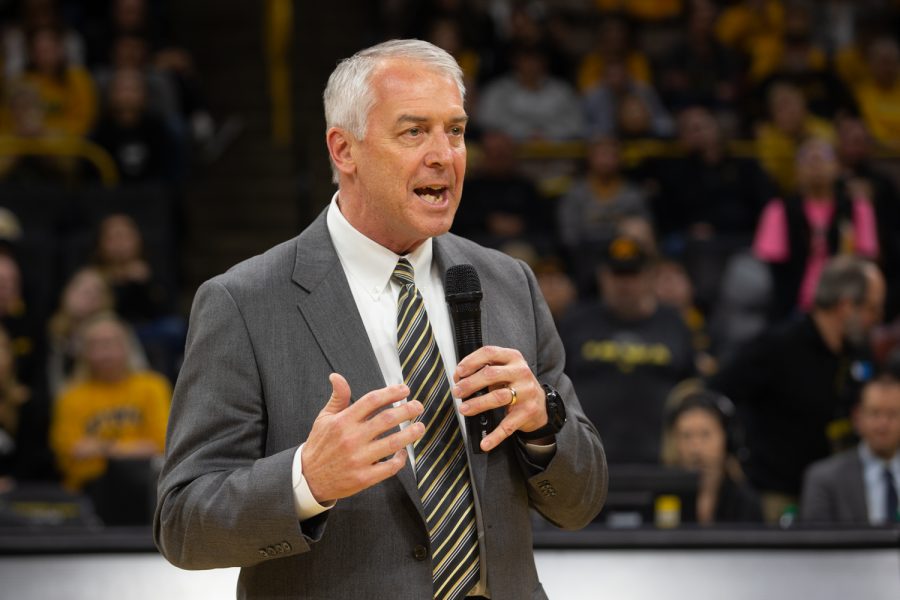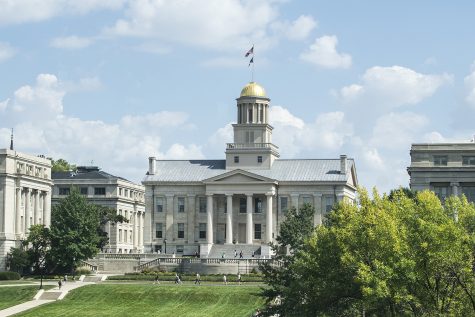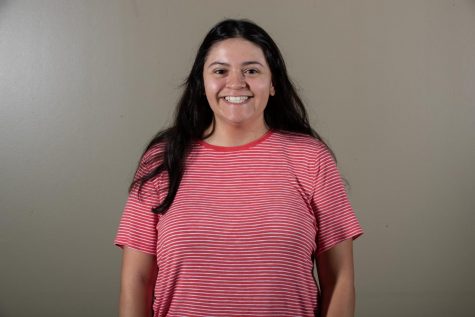Opinion | Iowa Athletics abandons ‘Win, Graduate, Do it right’ in the face of budget cuts.
The letters explaining the decision to cut four varsity programs at the University of Iowa do little to properly do so.
University of Iowa athletic director Gary Barta discusses former Iowa basketball player Megan Gustafson’s career during the retirement ceremony for her number 10 jersey following the Iowa women’s basketball game against Michigan State University on Sunday, Jan. 26, 2020 at Caver-Hawkeye Arena. The Hawkeyes defeated the Spartans, 74-57.
September 9, 2020
On August 21st, the athletic community at The University of Iowa received an email with an open letter from University President, Bruce Harreld and Athletic Director, Gary Barta. This letter marked the official release of the decision to cut four of Iowa’s varsity sports programs.
It provided reasons for the decisions, a FAQ sheet with answers to potential questions, and shared their deepest condolences – but what it didn’t do is provide answers that made sense.
In the letter, President Harreld and Gary Barta outlined a projected revenue loss of $100M for the upcoming fiscal year and officially released the decision to cut men’s and women’s swimming & diving, men’s gymnastics, and men’s tennis. No one expected the ramifications of the revenue loss to yield good news, but we had hoped for more.
In a separate document titled ‘Iowa Athletics Sports Sponsorship FAQ’ a number of questions were answered surrounding the decision. The document covered how decisions might affect Gender Equity and Title IX compliance, the reasons why these sports were chosen for elimination and what might happen in a scenario where donors step forwards to endow particular programs.
The department stated its gratitude for the many loyal and generous donors but made clear that the decision to reduce program offerings was final. In short – no donations, endowments or fundraising efforts would be considered.
The first reason listed for why these sports were cut, was ‘History of the sport at Iowa’, or the apparent lack thereof. In the case of swimming and diving, this is almost laughable, as Iowa’s very own David Armbruster, who coached at Iowa from 1917 to 1958, played a huge role in the development of the butterfly stroke, now an Olympic event. Then in 1935, Jack Sieg, a swimmer at Iowa, also developed a kick technique later named the ‘Dolphin Fishtail kick’. Perhaps this particular reason was listed in relation to men’s tennis or men’s gymnastics, but that feels like a stretch.
“Current and future prospects for success of the sport,” was another listed reason for why these sports were chosen for elimination, but with men’s tennis being ranked in the top 20 for the first time in program history, and men’s gymnastics having won the Big 10 regular season title in 2019, this again feels poorly thought-through and is simply untrue.
The best-case scenario would have been for the information in the letters, though heart-breaking, to provide clarity and perhaps even create a sense of acceptance. The Hawkeye community needed the reasons for cutting these sports to have made sense, but if anything they felt shallow and phony.
It has been said that cutting the teams mentioned above would save Iowa Athletics over $5 million annually. Meanwhile, according to the Des Moines Register, Iowa is paying its assistant football coaches $5.27 million in base salaries this season. That is $575,000 more than a year ago, even factoring in the 10 percent pay cuts for any coach making $200,000 or more a year.
Cutting varsity sports at Iowa was never going to be easy and was always going to be painful. As a member of the athletic community, I want to believe that Barta and Harreld did their best to preemptively answer any questions in an attempt to provide some form of closure.
Unfortunately, an attempt was all it was.
Columns reflect the opinions of the authors and are not necessarily those of the Editorial Board, The Daily Iowan, or other organizations in which the author may be involved.

















